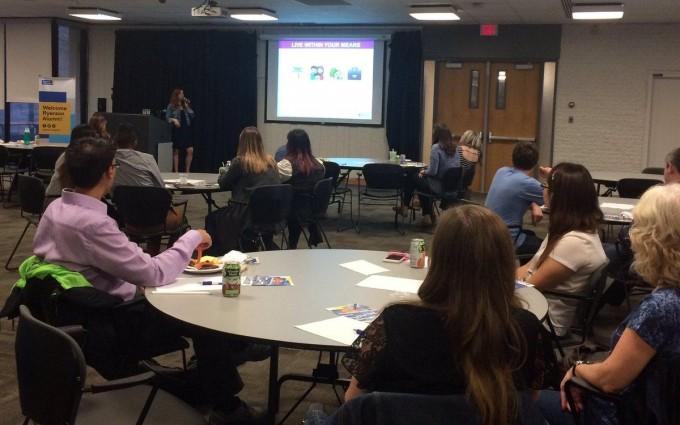By Nikhil Sharma
Ryerson grads took advice from a financial planner at a seminar Thursday evening. Shannon Lee Simmons spoke with recent grads about how stick to a budget, prioritize investment goals, overcome debt and benefit from tax-efficiency.
“It’s a hard,” Simmons said. “The job market is really tight and life is expensive.”
Alexandra Sebben is one of 35 Ryerson graduates who attended the seminar as part of the Blackboard to Boardroom event series. She graduated from media production in 2015 and earned a master’s degree in professional communication earlier this month.
She attended the seminar to learn some tools on budgeting their finances from Simmons, the founder of The New School of Finance.
This was Simmon’s second consecutive appearance as a guest speaker at the workshop, which was organized by Ryerson Alumni Relations.
Even with Sebben’s internship experience and specialization in corporate communication, finding a job in her field has been a slow process.
“I find that a lot of the positions are looking for two to three years of experience,” she explained. “And although I have internship experience, I don’t have full-time experience.”
With home prices in the Greater Toronto Area skyrocketing, having limited opportunities to employment is keeping Sebben away from the real estate market.
“I will not be investing in a condo or house probably for another 10 to 20 years because I still have to pay off my OSAP before I can consider investing in a house,” she added.
The Canada Student Loans Program, which gives loans and grants to post-secondary students who demonstrate financial need, provided 491,400 full-time students with $2.7 billion in financial assistance and 11,300 part-time students with $19.9 million, according to its 2013-2014 annual report.
In 2015, The Canadian University Survey Consortium surveyed 18,000 university graduates from 36 Canadian institutions and found that about 50 per cent have an average debt of $26,819 attached to their university education.
“The higher your fixed costs are, the less choices you have,” Simmons said, explaining the relationship between debt and affording a home.
According to the Toronto Real Estate Board (TREB), a record 9,813 homes were sold by its agents in August, a 23.5 per cent increase on a year-over-year basis, with an additional two working days included this year.
The selling price for an average home was $710,410, a rise of 17.7 per cent. Detached homes in Toronto had an average cost of $1.2 million, an 18.3 per cent increase from August 2015.
Simmons said that keeping fixed costs such as transit, utilities, cell phone bills, prescriptions and groceries to about 50 per cent of your after-tax take-home income (one’s gross salary before deductions) is important. Keeping 20 per cent of your earnings for savings and the remaining 30 per cent for trips and debt repayment should help one stay balanced financially.
“If it (fixed costs) goes over 65 per cent is when you should be nervous,” she said.
Recent graduates will often prioritize paying back massive student loans, something Simmons says is better than stashing money, which should only be done when unemployed.
However, she says anything that increases your assets or liability is something young people should prioritize.
“People want to buy a house so bad that they’re stretching so far beyond what they can afford and then obviously things happen,” she said. “Like termites, the roof leaks or the furnace breaks and there’s nowhere to go for that money because they’re so tapped on their fixed costs alone.”
Simmons said it’s a “big real estate risk” to not put any money into a Retirement Savings Plan (RRSPs) or Tax-Free Savings Account and to throw all your funds towards a house as a long-term investment.












Leave a Reply